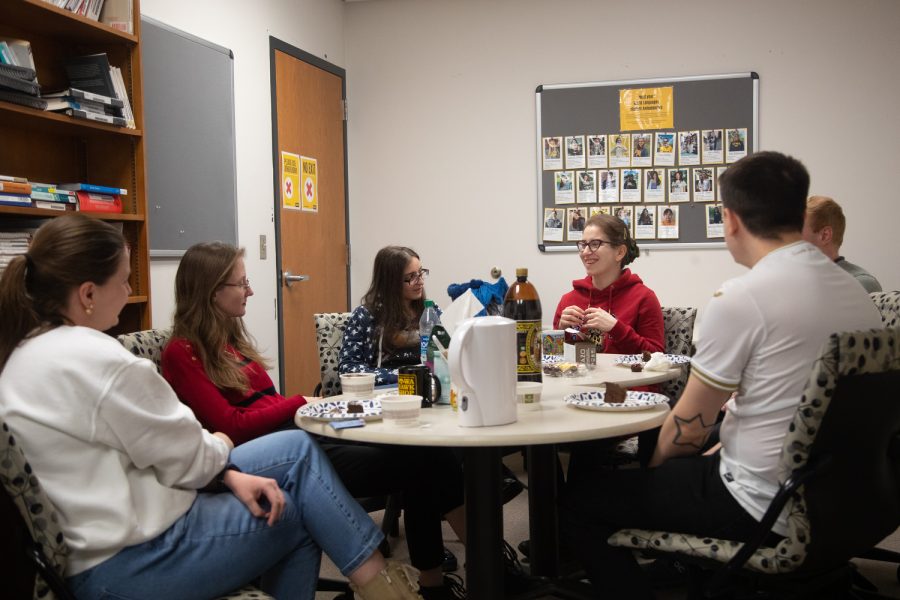UI students from Ukraine talk about their experiences living in Iowa City as the war exceeds one-year mark.
Students Ania Makarenko and Oksana Hirchak are both from Ukraine and have been living in Iowa since the war broke out in their homeland. In an interview with The Daily Iowan, both students shed light on their experiences living in Iowa City while the conflict continues raging.
The Ukrainian Conversation Hour, hosted by Oksana Hirchak, holds their weekly meeting in Phillips Hall in Iowa City on Thursday Mar. 2, 2023.
March 7, 2023
The world has felt the impact of the Russia-Ukraine war, which has lasted over a year, and Iowa City is no exception.
The war in Ukraine started in February 2022 after Russian president Vladimir Putin ordered an invasion. Russia still classifies the Ukraine invasion as a special military operation after a year of fighting.
Ania Makarenko is a first-year student at the University of Iowa majoring in economics and finance with a minor in Spanish. Makarenko came to the U.S. with her family in May 2021 when she was 17 years old.
Makarenko is from Bila Tserkva, located only 48 miles south of Kyiv. The town saw constant bombing from Russian forces in the first days of the war.
“Having my relatives there and my friends there is a constant worry,” Makarenko said.
The conflict has claimed thousands of lives, but exact estimates vary because of the challenges of collecting casualty data during an active conflict. The latest report from the United Nations Human Rights Office estimates at least 8,000 non-combatants have been killed. The U.S. reported in late 2022 that more than 200,000 soldiers were killed on both sides.
Makarenko said she and her family check the news constantly, which she finds stressful because of the constant atrocities committed against Ukrainians daily — notably killings of Ukrainians in towns such as Bucha.
“I continue with my studies and my extracurricular activities, but it’s just harder to do that,” she said. “Everyone’s enjoying life, and it’s not a bad thing. It’s just that it makes me feel guilty and think about how people in Ukraine can’t live a normal life now.”
Oksana Hirchak, a UI psychology student, said it is depressing to be far away from the war where she can’t do anything. She came to the U.S. from Ukraine in August 2021.
“When I say that I am from Ukraine, some people ask how are things, some students read the news and they know what’s going on, but some people do not say anything,” Hirchak said. “The coursework in a way was distracting because it means I would not have to concentrate on the news.”
RELATED: Professors discuss Russia-Ukraine war after year of conflict in UI panel
Hirchak said she feels some guilt living in the U.S. while the war continues.
“I feel in a different way because I realized that we have to fight because it’s for our identities, for our values, for our history, for our culture,” Hirchak said.
Hirchak hosts an on-campus club called Ukrainian Conversation Hour, which allows people to learn Ukrainian and talk about the country’s culture.
Makarenko and Hirchak are cautiously optimistic about the Ukrainian military’s ability to thwart Russia.
“The Russian president was saying they would be able to take Kyiv in three days … which didn’t happen, and I think that the Ukrainian army has become even stronger, and all we need is weapons,” she said.
Makarenko paints a similar picture of the Ukrainian army’s strength.
“I don’t think Ukrainians think of themselves as a small nation,” Makarenko said. “We’re definitely not small, and that’s what helps us continue fighting and continue defending the country.”
Hirchak said Ukraine needs support, not just from the people of Ukraine, but from the whole world.
“I think we need to support Ukraine now. Because if we don’t do that, and if Ukraine is taken over, then there will be a threat for Europe, for America, for the rest of the world,” Hirchak said.



